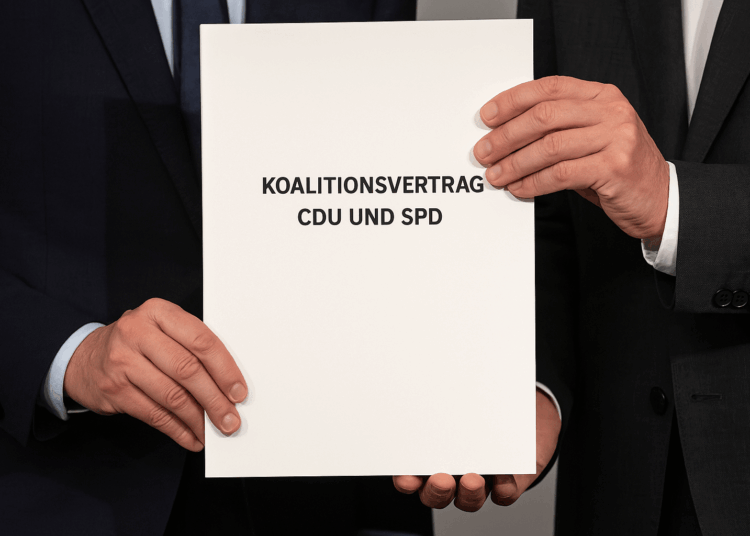The 2025 coalition agreement of the (presumably) new federal government under the leadership of the CDU/CSU and SPD contains extensive plans in commercial and business law. The most important innovations and reforms relating to companies, the self-employed and investors are systematically summarized and legally classified below. The focus is on changes to tax, company, contract and competition law, the promotion of start-ups and SMEs, the digitalization of administration and digital business models, investment and funding programmes as well as EU-related and state policy initiatives.
Tax law changes for companies and investors
Degressive depreciation and reduction in corporation tax: companies are to benefit from an “investment booster”: A special declining balance depreciation of 30% will be introduced for purchases in 2025, 2026 and 2027. This enables faster depreciation of investments in machinery and equipment and acts as a tax incentive, similar to turbo depreciation. In addition, the corporation tax rate will be gradually reduced by a total of 5 percentage points from 2028 – in five annual steps of 1 percentage point each. This would reduce the nominal corporation tax rate from the current 15% each year from 2028, bringing the total tax burden (including trade tax) from ~30% closer to ~25% in the long term. This relief is intended in particular to increase the international competitiveness of German companies.
Option model and preferential treatment of retained earnings: Many medium-sized companies are not corporations, but are taxed transparently (income tax). In order to achieve neutrality in terms of legal form, the option model in accordance with Section 1a KStG – which allows commercial partnerships to be taxed like a corporation – is to be significantly improved. The preferential treatment of retained earnings under Section 34a EStG will also be reformed. This preferential treatment currently allows sole proprietorships and partnerships to tax profits that are not withdrawn at a low tax rate. The plan is to make both instruments simpler and more attractive so that retained profits and reinvested profits are tax-privileged and are not progressively eaten up by high income tax. This will also allow partnerships and sole traders to benefit more from the reductions in corporation tax. It is also being examined whether newly founded companies can fall within the scope of corporation tax from 2027, regardless of their legal form. This review points to a possible future automatic option for start-ups to be taxed like corporations from the outset.
Relief on electricity tax and energy taxes: To reduce energy costs for the economy, electricity tax will be reduced to the EU minimum. A reduction of at least 5 Ct/kWh is planned by lowering the electricity tax “as quickly as possible” to the lowest rate permitted under European law. This will relieve the burden on energy-intensive companies in particular and strengthen the competitiveness of the industrial location. Certain levies and grid fees are also to be reduced, e.g. the abolition of the national gas storage levy has been agreed. Overall, this will result in noticeable cost reductions for companies in energy-intensive sectors.
Relief for small and medium incomes: Although this is not a priority for companies, income tax for small and medium-sized incomes is to be reduced in the middle of the legislative period as part of a broad-based tax reform. This will also indirectly benefit owners of small businesses and partnerships who pay income tax on their profits. However, the solidarity surcharge will remain unchanged – a complete abolition (which was desirable from the perspective of many entrepreneurs) is therefore not part of the agreement.
Trade tax and municipalities: There are no fundamental changes to the trade tax itself – the municipalities retain sovereignty over the assessment rates. However, it is noted that low assessment rates can be used to attract companies, and the aim is to prevent municipalities with low tax revenues from suffering financial disadvantages as a result. The plan is to support municipalities that deliberately choose a low trade tax rate for competitive reasons. This detail shows the link between federal and municipal tax policy without a specific federal law being mentioned (possibly via the municipal financial equalization system).
Research allowance and other tax incentives: In order to promote innovation, the research tax allowance will be significantly expanded – the funding rate and assessment basis will be significantly increased and the procedure simplified. This increases the tax incentives for R&D expenditure by companies (the research allowance under the Research Allowance Act (FZulG) was previously capped; this cap will be relaxed). Furthermore, overtime pay and extended working life in the employee sector are to be taxed more favorably (e.g. through a new tax incentive to extend working hours for skilled workers) – such measures also have an indirect effect on the availability of labor for companies. Overall, the coalition is relying on tax relief and investment incentives to stimulate growth.
Company law: reforms for companies and new legal forms
Stock corporation law on defective resolutions: The coalition paper provides for a reform of the law on defective resolutions under stock corporation law. This concerns the contestation and nullity of resolutions passed at general meetings (Sections 241 et seq. AktG). The reform is intended to strengthen legal certainty and the competitiveness of the business location and curb opportunities for abuse. Specifically, it can be assumed that the legal requirements for challenging resolutions passed at general meetings (often used by shareholder minorities to block resolutions or force delays) will be tightened and procedures accelerated. For stock corporations and investors, this is likely to mean less legal uncertainty when it comes to corporate decisions, as abusive avoidance actions will be made more difficult. This change requires an amendment to the German Stock Corporation Act (AktG), in particular Sections 243 et seq. AktG, for example to set clearer deadlines, filters for the right to sue or higher requirements for the presentation of legal violations.
New legal form “asset-locked company” and cooperative law: Another innovative step is the planned introduction of a new independent legal form, the “asset-locked company”. This is a company model in which the assets are permanently dedicated to a specific purpose and cannot be distributed to shareholders (asset lock principle). The coalition cites the characteristics of an independent asset lock and membership participation without special tax privileges or discrimination. This model is apparently aimed at socio-ecological companies or purpose companies that want to reinvest their profits and not distribute them to external shareholders. The legal form is intended to offer an alternative to the classic GmbH, foundation or cooperative. Its introduction requires a new legal framework, presumably a separate law or an addition to GmbH law, as it is intended to stand “independently” alongside existing forms.
At the same time, the law governing cooperatives is to be modernized. Cooperatives (registered cooperatives under the GenG) are important for SMEs and social enterprises. Modernization could make it easier to establish a cooperative, raise capital or have it audited. Rigid rules may be relaxed to make cooperatives more attractive without losing their democratic nature.
Strengthening the liberal professions: Although not a classic company law, the text of the agreement also explicitly strengthens the self-administration of the liberal professions and their pension schemes. This underlines the fact that the coalition wants to retain the chamber structure and autonomy of lawyers, doctors, pharmacists, etc. This includes planned changes such as the reform of the status determination procedure for bogus self-employment in order to create more clarity as to who can be considered self-employed.
Overall, companies should be able to be clothed in suitable legal garments: Be it through more efficient stock corporation law procedures, new hybrid company forms with tied assets or continued strong cooperatives and liberal professions. These measures aim to make the legal framework more modern and flexible while at the same time preserving proven principles (co-determination, membership rights, asset retention).
Contract law and consumer protection: GTC reform, property development contracts, ticketing
Reform of the law on general terms and conditions among companies: The coalition plans to specifically reform the law on general terms and conditions (GTC). The background to this is that GTC clauses can currently also be invalid between companies (B2B) if they unreasonably disadvantage the other contractual partner (Sections 305 et seq. BGB also apply in principle to contracts between companies, albeit with a somewhat more generous standard). In future, large corporations within the meaning of Section 267 (3) of the German Commercial Code (HGB), which conclude contracts between themselves with general terms and conditions, are to be granted more contractual freedom. Simplified: Large companies should be able to rely on the fact that their general terms and conditions agreements concluded within the scope of private autonomy will be recognized by the courts. This would mean a considerable strengthening of contractual freedom in business transactions. In legal terms, this would probably amount to a restriction of the control of general terms and conditions in the B2B sector, for example by amending Section 310 of the German Civil Code (which provides for exceptions) or introducing a new threshold value: if two “large corporations” enter into a contract, the content of the contractual clauses would no longer be subject to review. This would make it easier to enforce extensive contractual risk transfers, liability limitations, etc. between such companies – which would improve legal certainty in business transactions and could make Germany more attractive as a contract location.
Property developer contract law – protection against property developer insolvencies: In the real estate and construction sector, the coalition wants to examine how consumers can be better protected against developer insolvency when purchasing real estate. At present, property development contracts are often based on Section 650u of the German Civil Code (BGB), whereby payments are made according to the progress of construction and a security of 5% is retained. However, if a property developer goes bankrupt, purchasers are threatened with loss and unfinished properties. Possible approaches by the coalition include insolvency protection models such as fiduciary management of advance payments, completion insurance or the extension of statutory guarantee obligations. Specific standards were not mentioned, but adjustments to the Real Estate Agent and Property Developer Ordinance (MaBV) or the German Civil Code (BGB) are conceivable. For consumers, this would mean more confidence when buying off plan, for property developers possibly increased requirements (which, however, reputable providers often fulfill anyway).
Regulation of the secondary ticket market: Another advance in consumer protection law is the planned stricter regulation of the secondary ticket market (resale of tickets). Through so-called “ticket touting” and online exchanges, consumers often pay extreme prices and sometimes fall for fraud. The coalition wants to curb extortionate prices, a lack of transparency and unfair practices in the resale of tickets. Planned measures include price caps for resales, transparency obligations regarding the original price and identity of the seller as well as a notice-and-takedown obligation for platforms in the event of false information. This means that ticket exchanges would have to remove reported false information (e.g. manipulated prices or incorrect ticket categories) immediately. Organizers should be able to take better action against ticket speculators. In legal terms, this is likely to result in an amendment to the Unfair Competition Act (UWG) or special provisions in the Trade Regulation Act. Resales are already restricted in the general terms and conditions of some event organizers; in future, legal barriers could be drawn. This increases consumer protection and the chances of getting tickets at the original price, while making speculative transactions less attractive.
General consumer protection and contract confirmation: In addition, consumer protection is to be comprehensively strengthened. An important concrete innovation is the introduction of a general confirmation solution for continuing obligations initiated by telephone. This means that if, for example, an energy contract, magazine subscription or similar is concluded over the phone, it should only become effective if the consumer subsequently confirms the contract again, for example in writing or by clicking on it. This protects against fraudulent contracts through telephone advertising. Germany also wants to work at EU level to close protection gaps in digital consumer law and make digital services consumer-friendly by design – keywords: pre-set data protection friendliness, transparent algorithms for product searches, etc. The 2021 debt collection reform will also be evaluated and any remaining abuse by debt collection companies will be combated, e.g. to further curb excessive debt collection fees.
These contract and consumer law measures strengthen the freedom of contract between professional companies on the one hand, while on the other hand providing more protection for consumers in sensitive areas (real estate purchases, ticket purchases, telephone advertising). Companies should pay close attention to the reform of general terms and conditions – a considerable easing of B2B business is on the horizon here. Consumer-related sectors (property developers, event organizers, debt collection), on the other hand, must be prepared for additional regulations.
Competition law: Faster, more effective and suitable for Europe
More efficient antitrust proceedings and Digital Markets Act: The coalition agreement emphasizes that fair competition is constitutive for the social market economy and therefore announces the further development of competition and antitrust law. Specifically, antitrust proceedings are to be accelerated and made more efficient in order to provide companies with legal clarity more quickly. This presumably includes strengthening the staff of the Federal Cartel Office and procedural reforms (e.g. in review proceedings). Effective enforcement of the EU Digital Markets Act (DMA) will also be supported. The DMA has been in force since 2023 and regulates large digital gatekeeper platforms. The coalition wants to ensure that the responsible authorities (primarily the EU Commission, possibly the German Federal Cartel Office as the national arm) take swift and effective action against the abuse of market power in the digital market. For big tech companies, this means a clear statement that Germany supports strict control – for start-ups and SMEs, it offers the opportunity of fairer competitive conditions compared to large platform providers.
European sovereignty in competition law – relaxing merger control: The signal to give greater weight to European sovereignty and security interests in competition law, particularly in merger control, is interesting. This is the coalition’s response to debates such as the failed Siemens-Alstom merger in 2019, which was prohibited by the EU Commission on competition grounds, although it seemed necessary from a German/French perspective to form a European champion against Asian competition. The German government wants global competitiveness and Europe’s strategic interests to be given greater consideration in EU merger reviews in future. This may mean that Brussels is pushing for more flexibility in the Merger Regulation or politically wants to allow more exemptions for strategic mergers. The establishment of an expert commission on “Competition and Artificial Intelligence” at the Federal Ministry of Economics also fits in with this. This commission will presumably examine how AI can be used to improve market surveillance or how new AI-driven business models should be regulated without distorting competition.
Update of the ARC (“ARC XII”?): The previous government had already introduced digital economy antitrust law instruments with the 2021 (“GWB10”) and 2023 (“GWB11”) amendments to the ARC (e.g. Section 19a ARC against digital corporate power). A further amendment is now likely to follow in order to adapt national law to EU requirements (DMA, planned EU Digital Markets Regulation) and implement procedural accelerations. The coalition is explicitly talking about faster procedures and effective application of antitrust law. Companies can therefore expect shorter review times for mergers and more rigorous penalties for cartels.
No tax dumping in the single market: The commitment not to accept tax dumping and unfair tax competition in the EU is also worth mentioning. This is linked to competition law in the broader sense – the coalition wants to work towards ensuring that EU states do not create competitive advantages for themselves through extremely low corporate taxes (e.g. minimum tax rates, implementation of the OECD minimum tax of 15% globally). For internationally operating companies, this could mean that tax avoidance models within the EU are further reduced.
The bottom line is that the coalition is signalling that competition law is being modernized and Europeanized. Fast procedures, strong enforcement, including against digital groups, and strategic foresight for European company mergers are to be considered together. Companies will have the opportunity to stop abuse by competitors with market power more quickly, but also the challenge of ensuring that their own mergers or antitrust violations are consistently pursued. The Federal Cartel Office is likely to become even more important and perhaps gain additional powers, especially in conjunction with EU regulations.
Supporting start-ups and SMEs: cutting red tape and financing
One-stop store and foundation in 24 hours: A central concern is to make it easier to set up a company. The plan is to create a complete one-stop store that digitally bundles all official channels for founding a company on one platform so that a company can be founded within 24 hours. Notarial processes are to be simplified and digitized, including automatic data exchange between notaries, tax offices and trade offices. This ties in with the Online Access Act (OZG), but goes even further. Currently, founders often have to wait days or weeks for a commercial register entry, tax number, etc. – in future, all of this should be completed in one day. This can only be achieved through digital notarization (online notary appointments, as already introduced to some extent with the Digitalization Directive Implementation Act (DiRUG)) and close integration of all registers and offices. In legal terms, this means a large number of changes from the GmbHG to the Commercial Register Ordinance, but the direction is clear: Germany is to be transformed from a bureaucratic hurdle into a country of start-ups.
“Start-up protection zone” and reduction in bureaucracy: A “start-up protection zone” is even being considered. This could mean that new companies would bear less bureaucratic burdens in the first few years or experience leniency for minor infringements. For example, a moratorium on bureaucracy for start-ups would be possible, in which audits are suspended or reporting obligations are simplified. A concrete example in the agreement: statistical obligations – a moratorium on new statistical surveys is to apply for two years and all existing statistical obligations are to be reviewed. This will significantly reduce the burden on smaller companies in particular, which are often confronted with information forms (e.g. from the Federal Statistical Office).
Relief for SMEs and the skilled trades: The focus is explicitly on SMEs, the skilled trades and the solo self-employed. More flexible legal framework conditions, simpler procurement procedures and faster approvals are intended to support these backbone industries. This includes the abolition of unnecessary written form requirements, particularly in employment law – for example, it should be possible to conclude fixed-term employment contracts without a handwritten signature (i.e. digitally) in future. To date, Section 14 (4) TzBfG requires the written form; this hurdle is to be removed. The administrative procedure will also be innovated: The fiction of approval (Section 42a VwVfG), according to which an application is deemed approved if the authority does not make a decision within the deadline, is to become the rule – in future it will always apply unless expressly excluded by law. This is a paradigm shift in German administrative law that will greatly increase planning and investment security. For many applications, companies can then rely on the fact that the green light will automatically apply once the deadline has passed, instead of being left in uncertainty.
Master craftsman examinations and securing skilled workers: The permeability between vocational and academic education will be increased – master craftsmen will be able to study more easily and trainees will receive better support. Accelerated work visas and recognition procedures for foreign skilled workers will address the shortage of skilled workers. Together with the federal states, the skilled worker strategy is to be expanded, e.g. through uniform recognition procedures within 8 weeks for professional qualifications acquired abroad. This will benefit companies directly, as they will be able to recruit qualified personnel more quickly.
Business succession and start-up support in the skilled crafts sector: In the next few years, around 125,000 businesses in the skilled crafts sector will be handed over to successors. The coalition wants to facilitate business transfers and promote business start-ups in the skilled trades. This will presumably include advisory programs, financial support for those taking over businesses (e.g. guarantee banks) and the reduction of bureaucratic hurdles for business takeovers. In addition, the investment backlog in training facilities (master craftsman schools, inter-company training workshops) is to be reduced through reliable funding – an important point in order to maintain the quality of training.
Promoting special target groups: The coalition also wants to specifically promote female founders (female start-ups). Existing programs such as the Female Founders Fund could be expanded. It also emphasizes that there should be support specifically for defence and security start-ups by opening up public funding to such technology-laden start-ups. Women and diverse founders are to be given more support in order to increase their entrepreneurial potential.
In summary, the CDU/SPD coalition agreement sets clear priorities for a start-up-friendly climate: reducing bureaucracy, digitizing procedures and financial incentives are intended to noticeably relieve the burden on start-ups and SMEs. For start-ups and SMEs, this means fewer forms in future, faster administrative procedures (often no more physical ones) and better financing options (see next section). At the same time, investments will be made in education and skilled workers so that there are enough qualified employees to enable growth.
Digitization of administration and legal framework for digital business models
Digital state and once-only principle: A major focus is on the digitalization of administration. The goal is a forward-looking, networked, efficient and user-centered state that thinks “digital first”. Specifically, the federal, state and local authorities should implement the once-only principle, i.e. citizens and companies only have to enter certain data once and the authorities then use it together without media discontinuity. This principle avoids redundant applications – for example, a company that already has a tax ID would not have to enter the same information again at the trade office. Legal changes are necessary, e.g. in the Federal Data Protection Act and various specialist laws, to allow data exchange, but the direction is clear.
Digital identity and secure infrastructures: The coalition wants to establish a citizen-friendly digital identity – the Germany ID and the European E-ID (EUDI wallet) are mentioned, for example. This should make it even easier to go to the authorities digitally because you can identify yourself clearly and securely online. Investments are also being made in cloud infrastructures, networks and data centers to ensure digital sovereignty. A German Administration Portal (DVP) with sovereign standards is to be created to ensure data exchange and security. This also includes protection against cyber attacks, which is important for companies that entrust their data to the administration.
Open source and digital sovereignty: At a technical level, the government is promoting open source software and open standards. A Center for Digital Sovereignty (ZenDiS) and a Federal Agency for Leap Innovations (SPRIND) will be strategically aligned to advance key technologies in the digital sector. For companies, this potentially means more state-supported innovation projects and open platforms that they can use. The opening of interfaces in e-government will also enable start-ups to build on administrative data and offer new services (keyword GovTech).
Legal framework for AI, data and new business models: The coalition sees key digital technologies such as artificial intelligence (AI), quantum computing, robotics, ICT, photonics and nanoelectronics as central to the transformation. An AI offensive is being launched, including a “100,000-GPU program (AI Gigafactory)” to provide massive computing power for AI in Germany. Important from a legal perspective: the aim is to examine how liability rules need to be adapted with regard to AI at EU level. This means that the government is thinking ahead about how product liability or traffic liability, for example, should be when AI systems make decisions (e.g. autonomous driving, medical AI). The focus here is on EU initiatives (such as the draft AI liability directive), which Germany wants to actively support.
Data protection and data use also remain an issue: digital offerings should be consumer-friendly and data protection-friendly “by design” and “by default”. Companies must therefore be prepared for regulation that prescribes privacy-friendly default settings (in line with the EU General Data Protection Regulation and initiatives such as the ePrivacy Regulation). At the same time, the coalition wants to promote data spaces so that data can be better shared and used (keyword data pooling, data trusteeship – not explicitly mentioned in the text, but often called for by the CDU/SPD). It’s about the balance: data access for innovation vs. data protection.
Digital business models in the financial sector: FinTechs and crypto companies are also taken into account. The regulation of crypto assets, the gray capital market and shadow banks will be reviewed for loopholes and tightened if necessary. Following experiences with crypto exchanges and assets (e.g. insolvencies, cases of fraud), the aim is to ensure that investors are protected and that there are no regulatory loopholes. This is likely to mean changes to the Crypto Asset Transfer Act (KryptoTG), the Securities Trading Act and supervision (BaFin powers). At the same time, innovation should not be stifled – a difficult balancing act, but one that the coalition wants to master with a view to international competitiveness.
In summary, the digital state should become a reality: Efficient eGovernment processes, a digital identity, as well as clear rules for future technologies such as AI and crypto. This creates opportunities for companies (easier dealings with authorities, new business models in the GovTech sector) and clear guard rails (AI liability, data protection “by design”, stricter crypto rules). It is important that implementation takes place quickly – the coalition agreement specifically states, for example, that a commission should draw up proposals by Q4 2025 on how planning and approval procedures can be digitalized and made less bureaucratic.
Investment and funding programs: Germany Fund and Future Capital
Germany Fund – 100 billion for growth: A highlight of the coalition agreement is the establishment of a “Germany Fund” as a central investment and participation instrument. As an umbrella fund, this fund is intended to bundle private and state financing power. The plan is for the federal government to provide €10 billion in own funds (guarantees or financing) and thus mobilize at least €100 billion in investment capital via a leverage effect. The focus is on venture and growth capital for SMEs and scale-ups – i.e. later rounds of financing so that start-ups can remain and grow in Germany. Decisions will be made according to entrepreneurial criteria, meaning the fund will be professionally managed with the investment focus on Germany. Interesting: The model is intended to be a model for similar funds in the federal states, i.e. federal states could also set up their own regional funds. For innovative companies, this means more available capital for expansion, possibly comparable to the European Investment Fund – but with a national focus.
Future Fund and venture capital: The existing Future Fund (a fund for start-up financing with a volume of €10 billion by 2030) will be consolidated and expanded beyond 2030. The coalition explicitly mentions the WIN initiative (venture capital initiative) with a target of over €25 billion in investment, which is to be more than doubled. In addition, the entire start-up financing architecture is to be subjected to an “efficiency check” – i.e. it will be examined whether the large number of existing programs (High-Tech Gründerfonds, KfW Capital, development banks of the federal states, etc.) are well interlinked or can be better bundled.
Another aspect is that the Solvency II amendment at EU level aims to make things easier for institutional investors so that insurance companies, for example, can invest more in infrastructure and venture capital. By lowering capital requirements (where possible under European law), billions of euros in private venture capital are to be mobilized. Furthermore, an additional national fund of funds (an “additive national capital pot”) is being considered, if possible.
Modernize public funding programmes: The coalition wants to modernize funding rules and practices for industrial settlements and major projects and reduce bureaucratic hurdles. Particularly in the case of major investments (e.g. construction of a chip plant), funding approvals are to be issued more quickly and require less paperwork. The funding programmes for the decarbonization of industry will also be continued and optimized. In future, state funding should be linked to criteria such as location security – companies that receive high subsidies should, for example, commit to not relocating in the short term.
Sector-specific initiatives: Some key industries are explicitly mentioned: Biotechnology is promoted as a key industry and facilitated in regulatory terms (esp. with regard to new genomic techniques). This should help start-ups in the biotech sector – possibly through accelerated approval procedures for gene editing technologies or improved research conditions. The automotive industry is to continue to be supported, for example through purchase incentives for e-mobility and the expansion of the charging infrastructure. The agreement lists specific steps in this regard, including raising the price limit for company car subsidies for e-cars to €100,000, special depreciation allowances for e-vehicles, vehicle tax exemption for e-cars until 2035 and subsidies for plug-in hybrids and range extenders. These measures combine tax incentives with direct support programs (e.g. for certain technologies or income groups via the EU Climate Social Fund) Investors in CleanTech and e-mobility can benefit from this, as the demand side and infrastructure are supported.
Opening up to security and defense technology: Public financing programs (such as KfW or state investment companies) should also be opened up to security and defense technology. Until now, such dual-use or defense start-ups were often excluded from funding programs. In future, a drone or cybersecurity start-up, for example, should receive more support, which is considered necessary in view of the security policy situation.
As a result, the coalition agreement creates a comprehensive funding landscape that ranges from early funding (start-ups, female founders) to growth and equity capital (Deutschlandfonds, Zukunftsfonds) and sector transformation (automotive, energy, biotech). For companies and investors, this means better financing opportunities and predictable support for future-oriented projects. However, emphasis is also placed on efficiency – programs may be bundled in order to avoid overlaps (keyword: efficiency check).
EU-related commercial law projects
The coalition has a strong European approach to economic policy. Many of the measures mentioned refer to EU law or are aimed at exerting influence in Brussels:
- Expand the EU single market: The European single market should be further developed as a driver of the economy, particularly in the areas of energy, health (medical products, pharmaceuticals), digital, telecoms and transport. Competition in the single market should be based on innovation and performance, not on undercutting standards. There is clear opposition to tax dumping between EU member states and support for a genuine capital market and banking union (keyword: savings and investment union) in order to better mobilize private capital across the EU. For companies, this means that work is continuing at EU level on uniform rules (e.g. for capital market access), which should make cross-border business easier.
- Trade policy and agreements: In the treaty, the CDU/SPD support the EU Commission’s trade agenda. They want to conclude further free trade and investment agreements. The swift ratification of the EU agreement with Chile (raw materials partnership) and the agreements with Mercosur and Mexico are mentioned. Ongoing negotiations with India, Australia and ASEAN countries are also being supported. In the medium term, the aim is even to reach a trade agreement with the USA – this is remarkable after the end of TTIP. In addition, an EU-only approach is being promoted, i.e. trade agreements should not be mixed (i.e. they must be ratified by all national parliaments), but only EU-wide in order to enter into force more quickly. This promises new markets and fewer trade barriers for export-oriented companies.
- WTO and trade disputes: The coalition is committed to preserving the WTO system, but recognizes that reforms are needed (e.g. dispute settlement mechanism). Meanwhile, there is also a push to mitigate protectionist measures by others (such as US tariffs, as indicated in news reports).
- Carbon Border Adjustment Mechanism (CBAM): The coalition supports simplifications to the EU Carbon Border Adjustment Mechanism (CBAM). It welcomes the EU Commission’s proposals (omnibus package) and wants to make the mechanism less bureaucratic and more efficient. For companies, this means that the import duty on CO2-intensive products should remain manageable and not represent a disproportionate burden for importers or downstream companies.
- Customs union and e-commerce: In the upcoming reform of the EU customs union, Germany wants to ensure that e-commerce proposals are given preferential treatment. Background: In online trade, there are many small consignments from third countries where VAT/customs duties are often evaded. Digital solutions are needed here. Companies in online trade must prepare for new EU customs rules, which are likely to include reporting obligations for platforms and automated procedures.
- Reject EU legislation where necessary: It is interesting to note the clear statement that the planned EU soil law (an EU regulation on soil protection) will be rejected in order to prevent further pollution. It is also emphasized that national overfulfillment (“gold plating”) is to be avoided – for example, it was mentioned that a quota for climate-neutral aviation fuels (power-to-liquid) that exceeds the EU level will be abolished immediately. This shows that Where the EU sets minimum standards, this coalition does not want to go beyond them in order not to burden its own economy more than necessary.
- European social policy & employment law: At EU level, Germany is supporting the establishment of an EU-wide advisory network and an electronic European social security card. In addition, the aim is to simplify posting notifications in the EU – presumably through digitalization and harmonization. At the same time, care is being taken to make use of any leeway: The EU Working Time Directive allows for certain opening clauses; here, for example, the exception in the Working Hours Act (Section 10 ArbZG) is being extended to include the bakery trade so that work can be carried out in bakeries on Sundays. This is done while maintaining the high occupational health and safety standards, but helps a traditional industry.
- Complete the EU financial market: Efforts are underway to complete the European single financial market, including through uniform financial regulation. This goes hand in hand with Germany renouncing special national approaches. This should mean: Wherever possible, implementing EU regulations 1:1 and not adding stricter German rules on top (which was often the case in the banking sector, for example). For banks and financial service providers, there are therefore signs of more uniformity and fewer extra German rules.
Overall, the agreement underpins the fact that German economic policy is closely interlinked with EU policy. Companies must therefore not only keep an eye on German laws, but also on upcoming EU requirements (AI regulation, data file, Green Deal laws, etc.), which the government wants to actively help shape. One positive aspect is that burdensome extras (such as additional quotas or unilateral action) are to be avoided – this creates a level playing field within Europe. At the same time, the government is using the EU to introduce its own ideas (e.g. speeding up planning) at European level.
State policy initiatives with economic relevance
Although it is a federal coalition agreement, it also addresses some points that affect the federal states or have to be implemented by them:
- Implementation in the federal states – fictitious approval and random checks: The aforementioned extension of the fictitious approval requires changes to the administrative procedure laws of the federal states, as these have so far also only provided for the fiction in the case of special statutory orders. A joint initiative by the federal and state governments will therefore be necessary to ensure that the fiction applies everywhere. In addition, the federal states should be allowed to set thresholds below which random checks are sufficient. This could be relevant in trade law or food inspections, for example – small businesses would then no longer be fully inspected on a regular basis, but only on a random basis, which would require state law or ordinances.
- Funds in the federal states: As mentioned, the Deutschlandfonds should be a model for comparable funds at state level. Some states (e.g. Bavaria, NRW) already have venture funds; however, this could be followed by expansion or new co-financing with the federal government. This requires coordination and political alignment with the federal states.
- Cooperation on funding programs: Some funding programs – for example in the maritime industry – are to be coordinated with the coastal states. A fast-track construction initiative by the federal and state governments for universities and hospitals is also mentioned, which is relevant to the economy because it affects the construction sector and educational capacities.
- Implement skilled labor strategy: Securing skilled workers is being driven forward together with the federal states and local authorities. For example, recognition offices at state level are to be accelerated; the federal and state governments are setting up a working group to propose measures. The planned online social elections and projects in civil protection and disaster control will also only be successful with funding from the federal states.
- Cooperation in the judiciary and administration: In some areas, such as the bureaucracy reduction commission, the federal and state governments should work together to develop proposals. This concerns, for example, the question of which doubly regulated areas can be streamlined.
In short, the federal states play an important role in the implementation of many projects. The coalition is relying on cooperation with the federal states to push through economic reforms. This may include initiatives in the Bundesrat, for example in the reform of general terms and conditions or in tax law, where the approval of the federal states is required. For companies, this means that some simplifications (e.g. faster building permits on site) will only come if the respective federal state goes along. On a positive note, however, is the intention not to bypass countries, but to involve them – e.g. through joint working groups or the possibility of setting their own thresholds.
Conclusion
The 2025 coalition agreement between the CDU/SPD marks a shift in economic policy towards relief, digitalization and investment promotion. From a legal perspective, numerous legislative changes have been announced that directly affect companies, the self-employed and investors. From tax reforms (significant depreciation benefits, gradual tax reductions and option models) to innovations in company law (new legal form with tied assets, shareholder legal protection), adjustments to contract law (more private autonomy in B2B, consumer protection for telephone contracts and ticket purchases) to antitrust and competition law (faster procedures, consideration of European interests) – the planned innovations are far-reaching.
For start-ups and SMEs, the abundance of bureaucracy reduction measures – digital one-stop procedures, elimination of the written form, fictitious approval – as well as the improved financing situation through the Deutschlandfonds and an expanded Zukunftsfonds are particularly noteworthy. This combination could actually remove many of the obstacles that were considered to be holding back the German economy in the past.
Of course, these projects are subject to implementation. Many projects – especially in the area of digitalization – have already been announced in the past without being fully implemented. The challenge will be to achieve the ambitious goals (e.g. setting up a company in 24 hours, 100 billion fund volume, EU-wide coordinated procedures) in practice. In addition, a number of legislative initiatives must be introduced in the Bundestag and Bundesrat. Some of these (tax package, bureaucracy relief) have already been announced for the first year of government.
From the perspective of companies and investors, it is worth keeping a close eye on further developments. Concrete draft laws – for example on the 2025 tax reform or on company law – are likely to be submitted for consultation with associations soon. Overall, however, the agreement shows that the new government wants to strengthen Germany as a business location through legal certainty, lower taxes and more intelligent regulation. If implementation is successful, there could be noticeable simplifications in everyday business life in the coming years – from electronic and accelerated notary appointments to tax returns, from a boost in venture capital to a reduction in bureaucracy at all levels. The planned changes therefore represent a comprehensive modernization of commercial law that should put Germany ahead of the competition in Europe.












































